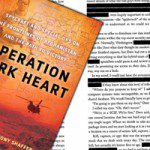The Defense Department paid $47,000 to destroy 9,500 unredacted copies of a former Army intelligence officer2019s new memoir, The Associated Press reported this week. The Pentagon contended that the book, Operation Dark Heart, by Anthony Shaffer, contained intelligence secrets and has therefore sought to destroy copies that were published before the book was redacted.
 But unredacted copies still exist. The book had originally been cleared by the Army and advance copies had been sent out before the Pentagon decided the book contained classified material. The New York Times bought one of these copies online a few weeks ago, compared it to the redacted version, and noted that some of the secrets were, well, not so secret:
But unredacted copies still exist. The book had originally been cleared by the Army and advance copies had been sent out before the Pentagon decided the book contained classified material. The New York Times bought one of these copies online a few weeks ago, compared it to the redacted version, and noted that some of the secrets were, well, not so secret:
The National Security Agency, headquarters for the government’s eavesdroppers and code breakers, has been located at Fort Meade, Md., for half a century.
Its nickname, the Fort, has been familiar for decades to neighbors and government workers alike. Yet that nickname is one of hundreds of supposed secrets Pentagon reviewers blacked out in the new, censored edition of an intelligence officer’s Afghan war memoir.
Another supposed secret removed from the second printing: the location of the Central Intelligence Agency’s training facility “Camp Peary”, Va., a fact discoverable from Wikipedia. And the name and abbreviation of the Iranian Revolutionary Guard Corps, routinely mentioned in news articles. And the fact that Sigint means “signals intelligence.”
Steven Aftergood of Secrecy News pulled together a side-by-side of redacted and unredacted versions of the book. It’s just a few pages, but it gives you a taste. Aftergood writes:
Perhaps 10% of the redacted passages do have some conceivable security sensitivity, including the identity of the CIA chief of station in Kabul, who has been renamed Jacob Walker in the new version, and a physical description of the location and appearance of the CIA station itself, which has been censored. Many other redactions are extremely tenuous.
In short, the book embodies the practice of national security classification as it exists in the United States today. It does not exactly command respect.
A recent secrecy report card, as we noted, found that government agencies spent nearly $9 billion in 2009 to maintain secrets on the books, while spending $45 million on declassifying documents. That works out to almost $200 spent on keeping secrets for every $1 spent declassifying them.
by Marian Wang
ProPublica


